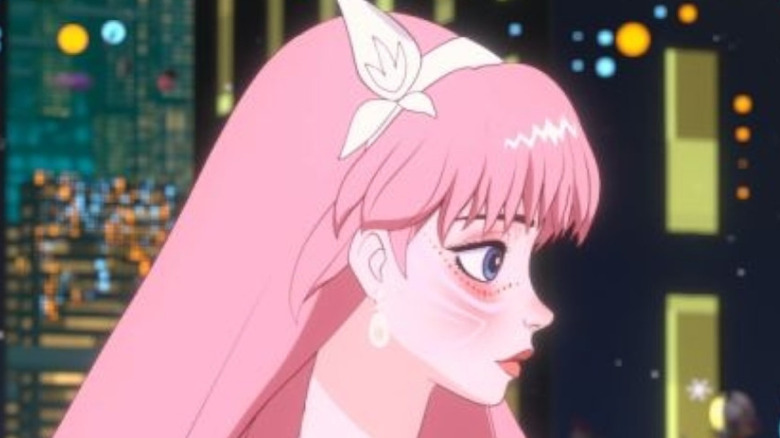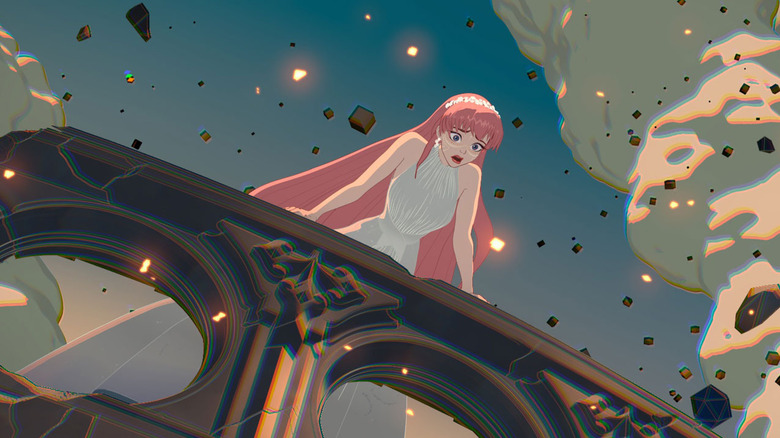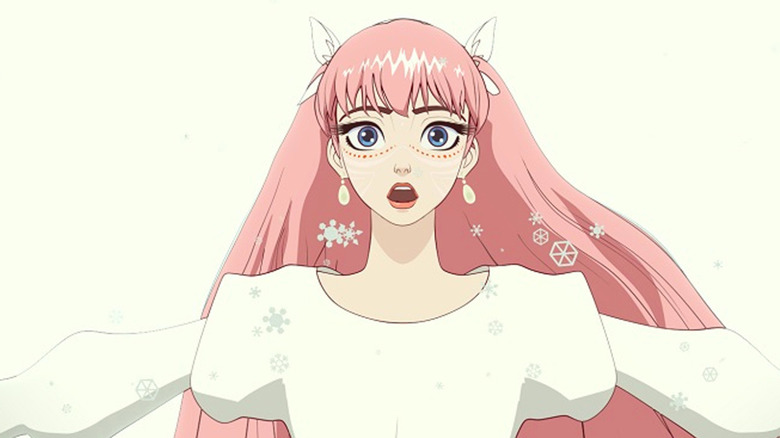Belle Review: A Remixed Tale As Old As Time
There's one thing you can definitely say about "Belle" — if Mark Zuckerberg sees this film, he'll be looking on with awe. Director Mamoru Hosoda's cyber reimagining of the timeless French fairytale "Beauty and the Beast" takes us deep within the world of U, a social network that is part Second Life, part TikTok, and all parts exactly what Zuckerberg has dreamed his Metaverse could blossom into. This is a densely populated world of five billion users, brought to life as a living, breathing city where interactive avatars are suspended from gravity, able to zoom directly into the celebrity and adventure that eludes them in their daily lives. Most films about social media exist only as a cautionary tale, but Hosoda's screenplay understands the reasons why we always log on, and finds something moving within the very human urge to present ourselves in a specific way online.
Naturally, "Belle" is a film that exists in a world of idealistic fantasy when it comes to how it presents the possibilities of social media, where the only divisions are petty arguments between fans of different pop stars, and the wider platform actually serves its intended purpose of connecting the lonely souls who need it. It does prove irresistible, even if you can imagine some Silicon Valley tech baron watching it and developing a website inspired by the film that inevitably turns out to be far more dystopian. But as with many of Hosoda's prior films, this is just at the core of an overstuffed narrative that consistently introduces new subplots which don't fully coalesce throughout the duration of its two-hour run time.
As it increasingly transforms into an ambitious reworking of "Beauty and the Beast," complete with a pseudo-detective mystery trying to unmask the real-world identity of the beastly figure (here known as the Dragon), the central character study of a girl using the platform to help rehabilitate from tragedy becomes more of a background concern. The film still dazzles, but the need to follow those familiar fairytale beats, while expanding on them to make them palatable for this cyber-setting, lessens the impact of the intimate moments when it's most emotionally effective.
Digital monsters
This central character is Suzu (voiced by Kaho Nakumara — Looper saw the subtitled version for review; a dubbed version with a voice cast including Manny Jacinto, Hunter Schafer, and Chace Crawford is also on general release), a 17-year-old girl who has become an introvert after a childhood tragedy. As a young girl, she witnessed her mother drowning while trying to save a child's life, with online forums very vocal about the apparent "selfishness" of leaving her own daughter without a mother to save another. The incident made her withdraw entirely, making her not only awkward around all but a few of her peers, but also completely unable to sing, her passion throughout childhood. When she signs up to U, a social media network that uses motion capture-style technology to let the user live a second, fantastical life in a bustling online city, her talent soon comes back to her. But this also comes at a price — as she becomes a viral sensation, her songs crossing over onto the charts, millions of people want to know who Bell (her pop star alias) really is.
Hosoda has explored the ways technology can affect our reality in several films. His first two outings as director, big-screen "Digimon" spinoffs (released outside Japan as one unsatisfactorily condensed film, "Digimon The Movie"), put the digital monsters into a scenario inspired by "WarGames," an allegory initially designed to grapple with turn-of-the-millennium anxieties about what would happen to technology upon entering the 21st century. This went on to inspire his 2009 film "Summer Wars," which bears the most superficial similarities to "Belle." Both films plunge the viewer head first into a virtual reality site that functions as social media — and in the vaguest possible sense, both deal with the ramifications of what happens when that tech utopia is interrupted by a destructive outside force.
"Summer Wars" is a less idealistic film than "Belle," its narrative hinging on the idea that social media can be hijacked, and that cyberterrorism can soon have devastating consequences for the world. In Hosoda's latest film, that force is a single user known as the Dragon (voiced by Takeru Satoh), who disrupts Bell's concert in front of an online audience of 100 million. The Dragon is something of a most wanted figure in the world of U, frequently getting into fights with other users — but bringing a beloved pop diva's performance to a halt is a step too far, and the efforts to unmask the Dragon intensify.
Log on for this
Although his film has been billed as a modern retelling of "Beauty and the Beast," Hosoda lifts very little beyond the bare bones for this remix of the tale as old as time. This story, quite crucially, drops the romantic aspect, despite a strange mid-film scene of exposition in which Suzu is accused of falling for a "bad boy." The hunt to unmask the beast is instead conceived as an exploration of individual responsibility, and whether Suzu can overcome the tragedy in her childhood to understand how to do the right thing, no matter the cost. But despite effective first and third acts, the film loses its footing in the middle, becoming preoccupied with the high school flirtations of secondary characters, and a bunch of red herrings about the Dragon's true identity, with none of the other suspects introduced into this story outside flashes of news reports. It's easy to be moved by the central emotional arc in Hosoda's film, but it's weighed down by too much convoluted storytelling in both the world of U and offline.
"Belle" is Hosoda's first film since 2018's "Mirai," which became the first non-Studio Ghibli-produced anime to receive an Oscar nomination for Best Animated Feature. As a result, this feels like his grandest work yet, with some high-profile collaborators in the form of veteran Disney animator Jin Kim (who designed Suzu's avatar Bell), and Irish animated studio Cartoon Saloon, best known for "Wolfwalkers" and "Song of the Sea," who helped bring some depth to the expansive world of U. When placed next to his previous ventures into cyberspace, "Belle" can be most clearly recognized as Hosoda's most ambitious work to date, beautifully realizing the sprawling online architecture where much of the story takes place in a manner only glimpsed in the likes of "Summer Wars." Filmmakers often stumble when trying to visualize the online world in a way that's cinematic — Hosoda depicts it in a way that will make even the most tech-averse person want to log on. It may not be fully successful as a reimagining of a fairytale, but as an immersive depiction of a vast online world, it is utterly irresistible.


